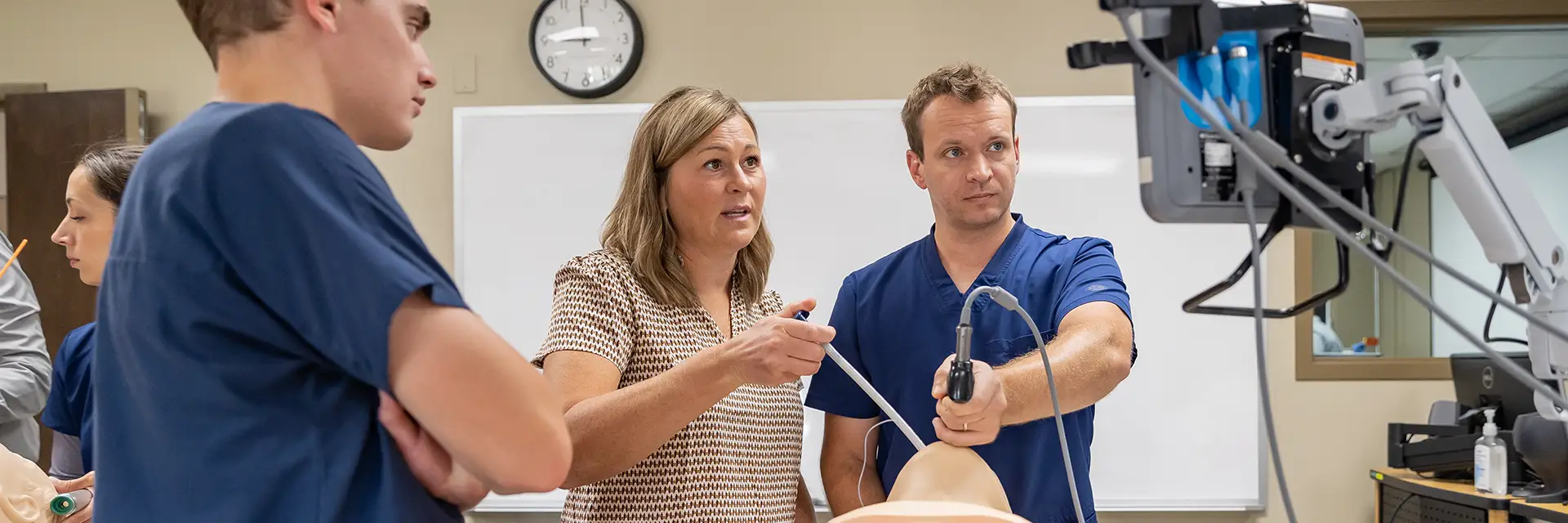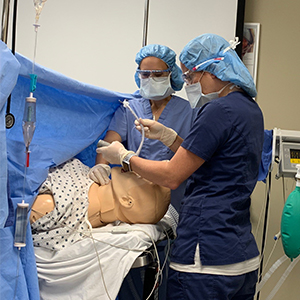
Nurse Anesthesia D.N.P.
We're committed to providing excellent classroom and clinical instruction as nurses travel the challenging and rewarding road to a career as a nurse anesthetist.
Nurse Anesthetists play a crucial role in a wide range of settings and procedures, ensuring safe administration of anesthesia and caring for patients when they are quite vulnerable. Graduate ready to be a Certified Registered Nurse Anesthetist (CRNA).
The first year of the program is held largely in the classroom on campus at the College of Nursing & Professional Disciplines. The remainder of the program will require travel to other cities within North Dakota, Minnesota, and South Dakota for clinical experiences.
UND Class of 2025 NCE Overall Pass Rate
UND Nurse Anesthesia Program
UND graduates over the past 5 years who have been employed as nurse anesthetists within six months of graduation
UND Nurse Anesthesia Program
Average number of 2025 graduating cohort cases. For reference, the COA requires 600 cases.
UND Nurse Anesthesia Program
Average number of 2025 graduating cohort clinical hours. For reference, the COA requires 2000 clinical hours.
UND Nurse Anesthesia Program
Students in Action
Experience a nursing simulation at the University of North Dakota! In this interprofessional simulation, undergraduate BSN and graduate Nurse Anesthesia Program nursing students work together to treat Glenn, a patient with severe burns and breathing difficulties. As his condition worsens, the team makes the critical decision to intubate, calling in a CRNA for the procedure.
Accredited by COA
UND is accredited by the Council on Accreditation of Nurse Anesthesia Educational Programs (COA) through 2031.
10275 W. Higgins Rd., Suite 906
Rosemont, IL 60018-5603
P 224-275-9130
accreditation@coacrna.org
UND's program has recently transitioned to the post-baccalaureate D.N.P. from the Master of Science. According to the Council on Accreditation of Nurse Anesthesia Educational Programs (COA), all Nurse Anesthesia programs in the United States must transition to a doctoral program by 2022. UND Nurse Anesthesia Program faculty believe, as innovators in Nurse Anesthesia education, that it’s important to be at the forefront of this transition to the doctoral level.
Apply
Application to the School of Graduate Studies is open from March 1 to July 15 of the year prior to the anticipated start date.
Interview Notifications
Early September
Nurse Anesthesia Program Interviews
Late September/early October
Requirements
Admission, Degree Requirements, and Courses
Critical care experience must be obtained in a critical care area within the United States, its territories or a US military hospital outside of the United States. During this experience, the registered professional nurse has developed critical decision making and psychomotor skills, competency in patient assessment, and the ability to use and interpret advanced monitoring techniques. A critical care area is defined as one where, on a routine basis, the registered professional nurse manages one or more of the following:
- Invasive hemodynamic monitors (e.g. pulmonary artery, central venous pressure, and arterial catheters)
- Cardiac assist devices
- Mechanical ventilation
- Vasoactive infusions
A minimum of one-year recent full-time critical care experience is required, two or more years is preferred. Examples of critical care units may include but are not limited to:
- Surgical intensive care
- Cardiothoracic intensive care
- Coronary intensive care
- Medical intensive care
- Pediatric intensive care
- Neonatal intensive care
- Trauma or neurological intensive care
While all nursing experience is valuable and is considered helpful in forming a well-rounded practitioner, we do not accept experience in the following areas to meet the critical care requirement:
- ER
- PACU
- Step-Down Units
- Cath Lab
- Interventional Radiology
- Surgery
We do not require CCRN certification for admission. However, we strongly encourage certification due to the competitive nature of our admission process.
The completion of an upper division Biochemistry or Organic Chemistry course at an accredited university or college is required prior to admission to the Nurse Anesthesia Program. If you have not met this requirement, you may still apply to the program and be accepted, however, the course would need to be completed prior to matriculating in the program. These required courses can be taken either in on-campus or online formats and it does not need to have a laboratory component. These courses are in addition to chemistry courses that are commonly taken as part of an undergraduate B.S.N. or B.A.N. program.
Examples of Biochemistry courses that will satisfy this requirement include (listed alphabetically):
- Lake Region State College – CHEM 260 Elements of Biochemistry (online course)
- Minnesota State University Moorhead – CHEM 400 Biochemistry I (online course)
- North Dakota State University – CHEM 260 Elements of Biochemistry
- UC San Diego - BIOL-40357 Biochemistry (online couse)
- University of New England – CHEM 1050 (formerly 1005 Medical Biochemistry) (online course)
- University of North Dakota – BIMD 301 Biochemistry and CHEM 341
Tuition & Fees
D.N.P TUITION, Fees & Additional Costs
Nurse Anesthesia Faculty

- jennifer.harrison@UND.edu
- 701.777.4509
-
Nursing Building Room 341
Grand Forks ND 58202-9025

- kevin.buettner@UND.edu
- 701.777.5915
-
CNPD Building Room 339
Grand Forks ND 58202-9025

- amber.johnson.5@UND.edu
- 701.777.4742
-
CNPD Building Room 343
Grand Forks ND 58202-9025

- james.sperle@UND.edu
- 701.777.4521
-
CNPD Building Room 349
Grand Forks ND 58202-9025
Certification, Employment and Attrition Rates
The first cohort for the Doctor of Nursing Practice degree program began in August 2018 and graduated in August 2021.
The overall pass rate on the National Certification Examination for the August 2024 DNP cohort was 100%. The first-time pass rate on the National Certification Examination for the August 2024 DNP graduation class was 79%.
The rate of attrition fo the August 2024 DNP graduation class was 5% (1/20).
One hundred percent (100%) of the August 2023 and 2024 DNP graduates are employed as CRNAs within six months of graduation.
